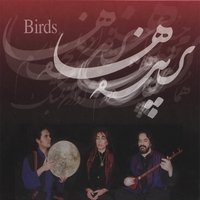| All Artists: Hossein Alizadeh, Homa Niknam, Madjid Khaladj Title: Birds Members Wishing: 0 Total Copies: 0 Label: Bā Music Records Release Date: 4/11/2006 Genre: International Music Styles: Middle East, Iran Number of Discs: 1 SwapaCD Credits: 1 UPCs: 3356573000440, 782843210128 |
Search - Hossein Alizadeh, Homa Niknam, Madjid Khaladj :: Birds
 | Hossein Alizadeh, Homa Niknam, Madjid Khaladj Birds Genre: International Music
|
Larger Image |
CD Details |
CD ReviewsSongs of freedom and devotion Nassim Sabba | New Haven, CT | 05/15/2007 (5 out of 5 stars) "In this CD, the Alizadeh and Khaladj duo extend their new interpretations of traditional Iranian musical systems. Their work demonstrates that the traditional system provides as much freedom in music composition as film has provided Iranian directors in the last 25 odd years, universal ideas expressed in a proven system. Maybe it has been easier for directors and visual artists to comment on social issues and freedom by creating visual allegories. Meanwhile, music, being the more restricted art in Islam, had remained focused on renewal of classical repertoires with little deviation from formalized types. Thus, composers rarely introduced new forms without violating the traditional dastgahs, or modes of music. Most attempts broke the system by too overt overlays of external forms. In this concert we hear one of the best of the successful works. This is a very thoughtful musical attempt at overtly focusing on current issues. They adapt poetry recitations in declamation form rather than the true goal of traditional singers of abstracting a nightingale, a Bird. This shift in poetry delivery allows the Alizadeh/Kkahladj duo, once again, to use modern interpretations of traditional Iranian musical stricture and refocus these diverse poems to new points of view. The compositions create a tension filled backdrop for the collage of poems from different centuries. These shift from suggestive love (mystic) melodies to militant chanting voices, and recalling many familiar linear folk compositions. The weaving and shifting produces a pregnant atmosphere in Horizon, composed as a pishdaramd (prelude). Homa Niknam enters and puts the exclamation mark to that prelude in the next cut, Birds. When birds can only watch the wind fly on, and virgin blossoms can only gaze at pure water flowing by, it is hard to miss the philosophical suggestions, the human condition. Niknam's voice and the musical accompaniment are what brings out the strength of these poems to weaves them in a new tapestry. The totality is enlarged as the trio shows that is not necessary to borrow from the outside or even leave the modal system, but to reinterpret what is a vast history of music and poetry. They simply add indirect undertones of outside influences, such as familiar western march and dance cadences to underline the focus of their poems. Alizadeh's performance moves with Homa Niknam's smooth voice like reflections on water, and when the words stop, Alizadeh seems to take flight, taking us to all the corners of the given dastgah (compositional mode), and then return in time to open the space for her to bring the poem back into the foreground. All this is accompanied by Madjid Khaladj's mesmerizing percussion. His "voice" is like a chorus "chanting" on the daf and the tombak. His beat carries the emotions of the pieces like the steady hands of an old friend, entering and leaving at crucial moments with swiftness and resolve. It is difficult to believe that there is only a single percussionist here, but so is the mastery of Madjid Khaladj. His perfect timing and shifting rhythms emphasize "flight and return" as the underlying theme of these compositions. The selected poems have, as always, have universal themes of human condition and are timeless. These diverse poets talk in one voice. Of freedom, in Birds, a poem by Azad, a contemporary poet - of justice in Fire, based on Majzoob Alishah's poem, "burning of the reed" (18th century), and of redemption of the soul in Mowlana's "as free as the moth", (11th century), in which the singed soul is urged to rise from the heart of the self-righteously set fire and accept life with humility. Homa Niknam's fresh approach to reciting classical poetry produces a strong rhetorical effect, even if you just listen to the music of her voice, aside from the words. Her work with the Moshtagh group, also based in Paris, opened many doors in Iran for female vocalists in the mid 90's. This work should help her strengthen her well deserved position in the expanding female vocal presence in the new era. Bringing art back to female singing is a welcome change from the cliché operatic westernizing, popular in the sixties and seventies Iran. Overall, one sees and enjoys the clear relationship between the vocalized words and the music, even if you don't understand Farsi. You can feel the built up and release of tension, freedom and lament, in this wonderfully composed and performed work. A must for serious music lover. " Austere Passionate Beauty PBSF | San Francisco, CA USA | 04/28/2006 (5 out of 5 stars) "It was this CD that served as my belated introduction to the rich and beautiful world of Persian Classical Music. And what an introduction it was.
As noted, there's a pervasive feeling of austerity that's present throughout this music, a potent silence that underlies even its most exclamatory moments. Add the passionate yet restrained lyricism that characterizes most of these pieces (which are really more like successive chapters within a single extended narrative), and you wind up with a musical counterpart of the same spirit that expresses itself in some of the best Persian poetry. The instrumentalists present on this CD, and especially Homa Nikham's vocals, are a perfect match for that expression." |

 Track Listings (5) - Disc #1
Track Listings (5) - Disc #1